Data Sufficiency Seating Arrangement




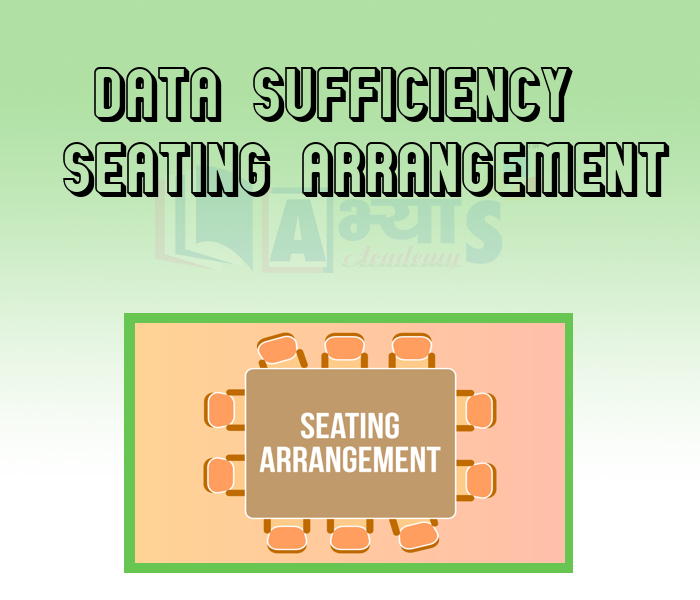
Data Sufficiency Seating Arrangement
The Data Sufficiency questions do not require the student to find the exact answer. Infact the only thing that a student is required to determine is that whether the statements provided in the question contain enough information for answering it.
You need to remember the steps involved in solving a particular Data Sufficiency question and follow them in this particular order: Check A (i.e. the first statement), then Check B (i.e. the second statement) and lastly, if required, combine the two statements to get the answer.
Data Sufficiency Involving Seating Arrangements:
The questions on seating arrangement with data sufficiency are regular feature of almost every competitive examination. In these questions, you have to arrange a group of persons fulfilling certain conditions. Here we can classify these problems into 4 types:
Direction : - Each of the questions below consists of a questionand two statements numbered I and II given below it. You have to decide whetherthe data provided in the statement are sufficient to answer the question.Read both the statements and give answer(a) if the data in statement I alone are sufficient to answer the question, while the data in statement II alone are not sufficient to answer the question;(b) if the data in statement II alone are sufficient to answer the question, while the data in statement I alone are not sufficient to answer the question;(c) if the data either in statement I alone or in statement II alone are sufficient to answer the question;(d) if the data given in both statements I and II together are not sufficient to answer the question; and(e) if the data in both statements I and II together are necessary to answer the question.
Question : - A, B, C, D and E are seated around a circular table facing at the centre. Who is to the immediate right of B ?
I. D is in between A and E.
II. C is in between B and E.
Answer (d) : - From I, we have : 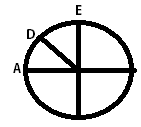
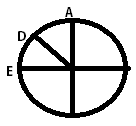 .
.
From II, we have : 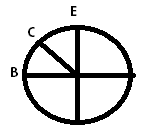
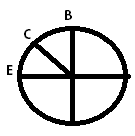
Combining the above two, we have :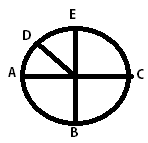
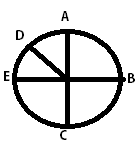
Thus, either A or C is to the immediate right of B.
The question below consists of a question and two statements numbered I and II given below it. You have to decide whether the data provided in the statements are sufficient to answer the question. Read both the statements and give answer Question : - P, Q, R and S are sitting around a circle facing at the centre . Who is to the immediate right of Q ? I. R is between P and S. II. S is to the immediate right of R. | |||
| Right Option : D | |||
| View Explanation |
The question below consists of a question and two statements numbered I and II given below it. You have to decide whether the data provided in the statements are sufficient to answer the question. Read both the statements and give answer Question : - P, Q. R, S and T are sitting around a circle facing towards its centre. Who is second to the right of P? I. R is to the immediate left of T and second to the right of S. II. Q is to the immediate right of S and third to the left of P. | |||
| Right Option : B | |||
| View Explanation |
The question below consists of a question and two statements numbered I and II given below it. You have to decide whether the data provided in the statements are sufficient to answer the question. Read both the statements and give answer Question : - Who is to the immediate right of P among five persons P, Q, R, S and T facing North I. R is third to the left of Q and P is second to the right of R. II. Q is to the immediate left of T who is second to the right of P. | |||
| Right Option : C | |||
| View Explanation |
Students / Parents Reviews [10]
It was a good experience with Abhyas Academy. I even faced problems in starting but slowly and steadily overcomed. Especially reasoning classes helped me a lot.

Cheshta
10thIt has a great methodology. Students here can get analysis to their test quickly.We can learn easily through PPTs and the testing methods are good. We know that where we have to practice

Barkha Arora
10thAbhyas is a complete education Institute. Here extreme care is taken by teacher with the help of regular exam. Extra classes also conducted by the institute, if the student is weak.

Om Umang
10thA marvelous experience with Abhyas. I am glad to share that my ward has achieved more than enough at the Ambala ABHYAS centre. Years have passed on and more and more he has gained. May the centre flourish and develop day by day by the grace of God.

Archit Segal
7thMy experience was very good with Abhyas academy. I am studying here from 6th class and I am satisfied by its results in my life. I improved a lot here ahead of school syllabus.

Ayan Ghosh
8thBeing a parent, I saw my daughter improvement in her studies by seeing a good result in all day to day compititive exam TMO, NSO, IEO etc and as well as studies. I have got a fruitful result from my daughter.

Prisha Gupta
8thAbout Abhyas metholodology the teachers are very nice and hardworking toward students.The Centre Head Mrs Anu Sethi is also a brilliant teacher.Abhyas has taught me how to overcome problems and has always taken my doubts and suppoeted me.

Shreya Shrivastava
8thMy experience with Abhyas academy is very good. I did not think that my every subject coming here will be so strong. The main thing is that the online tests had made me learn here more things.

Hiya Gupta
8thAbhyas Methodology is very good. It is based on according to student and each child manages accordingly to its properly. Methodology has improved the abilities of students to shine them in future.

Manish Kumar
10thOne of the best institutes to develope a child interest in studies.Provides SST and English knowledge also unlike other institutes. Teachers are co operative and friendly online tests andPPT develope practical knowledge also.
